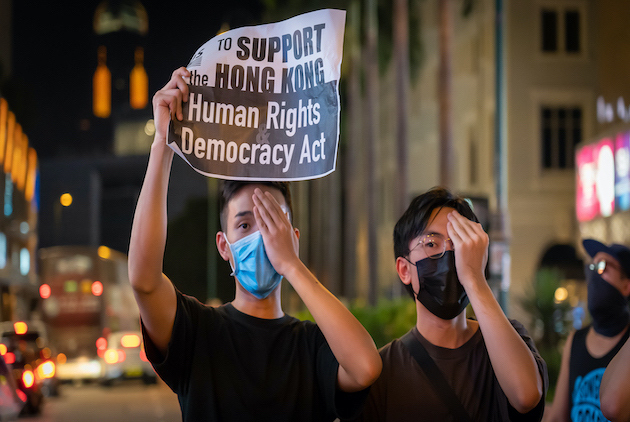Taiwan must help Hong Kongers targeted by the National Security Law

Source:Shutterstock
With the rising threat of National Security Law (NSL), Hong Kong people need more international humanitarian assistance than ever before. Why should Taiwan government amend its policy to support the safety and liberty of Hong Kongers?
Views
Taiwan must help Hong Kongers targeted by the National Security Law
By Grace Faerberweb only
Amid rising threats to the safety and liberty of Hong Kong people under the National Security Law (NSL), Taiwan, as the closest democratic neighbor, should amend its policy framework to offer greater, more tangible assistance to Hong Kongers.
The policies put in place in Taiwan when the NSL was first introduced in June 2020 are no longer sufficient to meet the challenges faced by Hong Kongers today. Amnesty International’s Asia-Pacific regional director, Yamini Mishra, described the NSL’s impact over the past year as the creation of a police state and human rights emergency in Hong Kong.
In an interview with Taiwan NextGen Foundation (TNF), Jerry Liu (劉仕傑), Director of International Affairs for the Taiwan New Power Party (NPP), described the crackdown under the NSL as the dissolution of Hong Kong’s independence, absolving the “one country, two systems” model and absorbing Hong Kong as a de-facto city in China, breaking the promise made by the Chinese government in 1997 to preserve Hong Kong’s 50 years of autonomy.
A year after the law was first introduced in Hong Kong, police have arrested or ordered the arrest of at least 118 people in relation to the NSL, with 64 people formally charged, of whom 47 are presently in pre-trial detention, as of 29 June 2021. Nearly all have been charged for speech violations or political acts; some now face life in prison. Additionally, more than 10,000 people have been arrested in connection with the pro-democracy protests in Hong Kong over the course of the past two years, ranging from ordinary citizens as young as twelve to lawmakers, journalists, and academics. Media outlets have shut down—most notably Hong Kong pro-democracy giant Apple Daily—or self-censored. Business leaders’ and companies’ assets have been frozen under the authority of the NSL. Schools have been ordered to ban any activities that express a political stance, and curricula have been re-written to instill an affinity toward China.
Taiwan’s Stance
In 2019 and 2020, support for Hong Kong’s pro-democracy movement was a highlight of the Democratic Progressive Party’s (DPP) campaign. DPP leaders and politicians repeatedly raised their support of Hong Kong’s months-long pro-democracy protests against Beijing’s encroachment and erosion of human rights, and linked Beijing’s threat to Hong Kong with challenges to Taiwan’s own sovereignty. In a DPP campaign ad titled "Speak loudly – two worlds version" the daily routines of Taiwanese people were contrasted with the chaotic situations that Hongkongers faced in 2019, urging Taiwan's citizens to defend the country's sovereignty on election day. At some of President Tsai Ing-Wen’s campaign rallies, Hong Kongers were reported shouting out “Liberate Hong Kong, revolution of our times” and waving the signature black flag of the Hong Kong protests, with young Taiwanese joining in the chants. Several Hong Kong student activists and legislators also visited Taiwan to observe the 2020 election as a model of democracy.
When the National Security Law was first implemented in Hong Kong in June 2020, Taiwan’s Mainland Affairs Council came out strongly against the law and established the Taiwan-Hong Kong Office for Exchanges and Services, which would assist Hong Kong citizens coming to Taiwan and handle affairs related to humanitarian assistance and care. In July 2020, Taiwan’s Mainland Affairs Council also released a position paper on the NSL, pledging Taiwan would “continue to support the Hong Kong people in their fight for freedom and democracy and provide them care and humanitarian aid.”
Beyond the Taiwan-Hong Kong Office’s services, Article 18 of the Act Regarding Hong Kong and Macao Affairs serves as the framework guiding the National Immigration Agency’s (NIA) treatment of cases from Hong Kong. Article 18 states “necessary assistance shall be provided to Hong Kong or Macau residents whose safety and liberty are immediately threatened for political reasons.” Under Article 18, NIA evaluates case-by-case whether “necessary assistance” should be granted to Hong Kongers.
President Tsai’s government has consistently held its position welcoming Hong Kongers’ immigration to Taiwan. However, amid the growing politically-motivated crackdown on safety and liberty in Hong Kong, Taiwan’s position must adapt.
Given the increasing number of arrests and infringements on freedoms and human rights, the severity of the National Security Law’s threat to Hong Kongers is more prevalent now than ever. Stronger action must be taken by Taiwan to meet the growing threat. Jerry Liu and other members of the NPP have proposed revising Article 18 to clarify the meaning of “necessary assistance,” improve government accountability, and provide concrete pathways for entry, immigration, and protection to Hong Kongers.
The Legislative Yuan should consider amending Article 18, and here’s why:
Article 18 does not specify the standards for assistance, how long the process should take, whether there should be financial relief or resources provided, or offer any other important details. Amending Article 18 would provide greater clarity to Hong Kong people as well as establish a set of standards for the treatment of their cases, heightening opportunities for governmental and legal oversight and accountability.
In an interview with Taiwan NextGen Foundation, Professor Margaret Lewis of Seton Hall Law School and Academia Sinica argued that Article 18 is “very vague” and doesn’t provide a solid legal foundation for Hong Kongers looking to claim an ability to stay in Taiwan. For people leaving Hong Kong because of a well-founded fear of being persecuted due to their political opinions, Dr. Lewis explained, there is no clear, reliable, legal pathway to stay in Taiwan long-term.
As the National Immigration Agency examines requests from Hong Kongers on a case-by-case basis, proper governmental oversight is very difficult to ensure; additionally, there is little legal restraint on the executive branch’s extensive discretion as to whether to grant asylum. In an interview with Taiwan NextGen, Yu-Jie Chen (陳玉潔), Assistant Research Professor at Academia Sinica and Affiliated Scholar at the NYU US-Asia Law Institute, described the lack of legal protections for asylum seekers, stating they have no way to know the criteria for asylum or the length of the process, and also lack the opportunity to appeal their case’s decision.
How this amendment would benefit Taiwan:
President Tsai and legislators have already taken steps to voice their frustration over the recent crackdown on press freedom in Hong Kong. In a Twitter post on June 24 President Tsai said she was "deeply saddened" by the shutdown of Apple Daily in Hong Kong, adding Taiwan will stand with Hong Kong in its struggle for freedom. After the closing of Apple Daily in Hong Kong, Legislators came out across party lines voicing their concern, with Taiwan People's Party lawmaker Lai Hsiang-ling (賴香伶), New Power Party Chairperson Chen Jiau-hua (陳椒華), KMT Party Chairperson Johnny Chiang (江啟臣), and DPP Deputy Caucus Whip Huang Shih-Chieh (黃世杰) all calling for freedom and democracy for the people of Hong Kong. Amending Article 18 would enable them to put their words to action and demonstrate that their support for Hong Kong is more than just talk.
The government in amending Article 18 would also very likely have the backing of their constituents, as the majority of the Taiwanese public supports Hong Kong democracy advocates. In a survey conducted by Academia Sinica in May 2020, 67 percent of Taiwanese residents polled supported Hong Kongers’ Anti-Extradition Movement, while among younger respondents (aged 18 to 34) the figure reached 85 percent. The poll also showed that Taiwanese residents support a free Hong Kong, and a majority of those surveyed agree with the statement that “backing Hong Kong is supporting Taiwan.”
Hong Kong people hope to emigrate, and amending Article 18 would ensure Taiwan stays one of their top choices. According to a survey by the Hong Kong Institute of Asia-Pacific Studies, 43.9 percent of Hong Kong citizens are planning to emigrate, half of which are already making preparations to do so; the main reason for emigration, at 50.7 percent, was the National Security Law. Among the preferred destinations for immigration, Taiwan ranks third, behind the U.K. and Australia, and ahead of Canada and the U.S. The U.K. suspended its extradition treaty with Hong Kong and has offered pathways to citizenship for millions of Hong Kong residents. Canada, Australia, and the US have also welcomed immigration from Hong Kong, offering new pathways to permanent residence for Hong Kongers. Amending Article 18 would enable Hong Kong people to view Taiwan as a more feasible option for residence as well.
On the global stage, taking substantial steps to assist Hong Kong residents targeted by the National Security Law would demonstrate how Taiwan can contribute to the international community - especially when it comes to human rights.
Given the unprecedented and rising threat to the safety and liberty of Hong Kong residents, the Legislative Yuan must amend Article 18 to step up to Taiwan’s role as a model democracy in East Asia and lend a helping hand to its pro-democracy friends in Hong Kong.
About the author:
Grace Faerber (馮思思)
Grace Faerber is a Junior Researcher at Taiwan NextGen Foundation, a second-year Master's student at the Hopkins-Nanjing Center, and a Boren Fellowship awardee studying political science at National Taiwan University.
Her LinkedIn can be found at http://linkedin.com/in/gracefaerber
Have you read?
♦ Despite Verbal Support for Hong Kong, Why is Immigrating to Taiwan So Hard?
♦ Hundreds of Hongkongers Came to Observe Taiwan’s Elections: What are They Taking Home from This Experience?
Uploaded by Claire Wei







